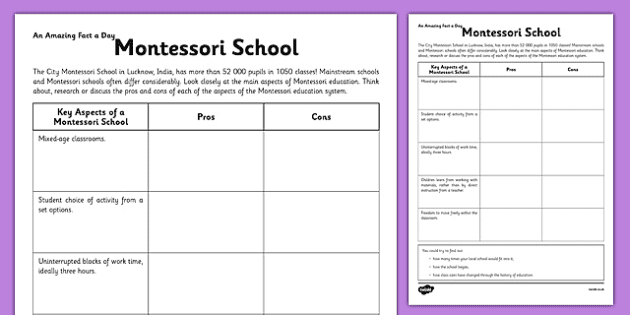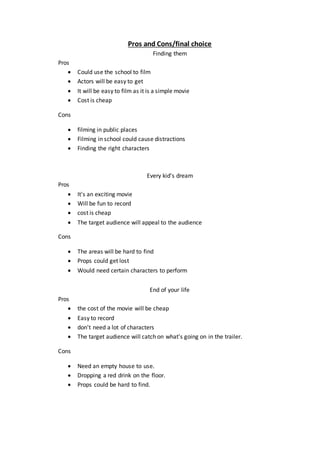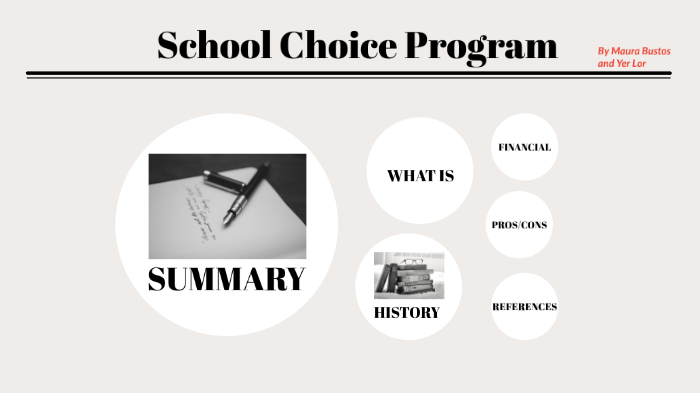School choice refers to the idea that parents or guardians should have the freedom to choose the school that their child attends, rather than being limited to the public schools within their designated attendance zone. There are several arguments both for and against school choice, and it is a complex and controversial issue.
One of the main arguments in favor of school choice is that it can increase competition among schools, leading to improvements in the quality of education. When schools are able to compete for students, they may be more motivated to offer high-quality programs and resources, such as advanced course offerings, extracurricular activities, and state-of-the-art facilities. This can result in better outcomes for students, as they are able to attend schools that better meet their needs and interests.
Another argument for school choice is that it can increase access to education for disadvantaged students. In some cases, public schools in low-income areas may be underfunded or under-resourced, leading to lower academic achievement among students. By allowing students to attend private or charter schools, school choice can provide an alternative to these struggling public schools and give disadvantaged students a chance to receive a better education.
However, there are also several arguments against school choice. One concern is that it can lead to segregation and inequality in the education system. If families with means are able to choose private or charter schools, while those with fewer resources are limited to public schools, it can perpetuate social and economic divides. Additionally, some argue that school choice can drain resources from public schools, as students who leave for private or charter schools often take their per-pupil funding with them. This can lead to a further decline in the quality of education at public schools, particularly in low-income areas.
Another concern is that school choice can create a "market" for education, with schools acting more like businesses and prioritizing profit over the needs of students. This can lead to a focus on attracting high-achieving students, rather than on providing a well-rounded education for all students, including those with disabilities or learning difficulties.
In conclusion, the debate over school choice is complex and multifaceted. While it has the potential to increase competition and access to education, it also raises concerns about segregation, inequality, and the commercialization of education. Ultimately, the pros and cons of school choice will depend on the specific context and how it is implemented in a given community.
More ‘school choice’ pros and cons

What are your thoughts on school choice? The grounds don't need to be mowed or plowed any less. The rest of charter results show they perform worse than public schools — a fact often seen by public school teachers who must catch up students who are returning from charters. The point of any kind of free-market choice system is NOT that every individual option you is automatically better than an existing one-size-fits-all solution. Current subsidies vary by state , but comprehensive studies demonstrate consistently that school choice programs save the government millions of dollars. I went to an elementary school with about three classes per grade. Similar studies in Milwaukee, where 80% of approved voucher schools are religious, showed that public school students outperformed their voucher counterparts. Washington, Utah, New Jersey, Delaware, and Pennsylvania are among the best states for teachers.
14 Pros and Cons of School Vouchers

What School District Has The Highest Paid Teachers? Taking money away from public schools to allow a few to attend private institutions takes funds away from public schools where it is greatly needed. One problem with school vouchers is that the system of school vouchers may not be sustainable. Getty Many backers of traditional public schools find it hard to imagine that many good people and their kids really do hate school. In fact, it is a bigger success than most education reformers could manage. My school was in a rich area, we received two sets of textbooks for every class, one for home and one in each classroom. Lastly, a longer campus commute can negatively impact physical and mental health, reducing time for more enriching activities. Liberals, however, warned that the billionaire led a crusade to dismantle public education.
The Pros and Cons of School Choice Essay

Many of the surrounding school districts are not as reputable so people, through a lottery, can choose to come to his high school—a public school in a different town. Since fewer children will choose to go to public schools if they have the opportunity to choose between many different school types, public schools will have to take measures to improve their education facilities so that more kids decide to go to their local public school instead of going to private schools. This includes the ability to send their students to private schools, religious schools, traditional public schools, or charter schools. Then, the choice is not a choice at all. Just because something worked in Spokane, doesn't mean its going to work in Orlando.
The pros and cons of ‘school choice’

Because of this, private schools are not likely to accept poor performing or behaving students who most likely would benefit the most from a private school education. Studies show that those class sizes are going to have negative impacts on learning. May improve the safety level of students In public schools, especially in those who are located in bad neighborhoods, schools are often quite unsafe and there had been several serious incidents in the past. Staffing levels are decided on the number of students when making the budget every year. However, the United States lags behind many other countries when it comes to education. Furthermore, not only do private and charter schools lack government accountability in regards to how funds are used, but they lack student achievement accountability. I'm not inclined to think that the average parent is a good or even middling judge of what subjects their children ought to be educated on, or how they ought to be educated.








